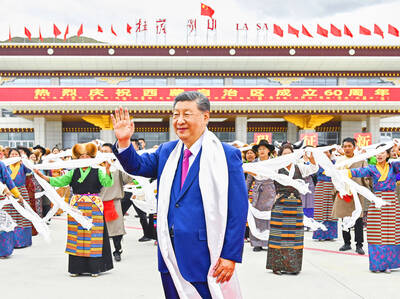The British government has been secretly awarding honors to senior figures in the US military and foreign businessmen with lucrative public sector contracts. A Foreign Office list details all non-British citizens that have been awarded honors since 2003 -- the first time the complete three-year dossier has been released.
It has emerged that Riley Bechtel, the billionaire boss of the US-based Bechtel Corp, which has won lucrative transport and nuclear contracts in Britain, as well as making a fortune from the Iraq War, was secretly awarded a Commander of the British Empire (CBE) in 2003.
This award has never been made public either by the British government or Bechtel. At the time Jack Straw, now Leader of the House of Commons, was the UK's Foreign Secretary.
Although there is no suggestion of any wrongdoing, questions are being asked about whether the Foreign Office kept the awards quiet for fear of a political backlash.
But the Foreign Office says this is normal practice. On releasing the information, the Foreign Secretary, Margaret Beckett, said: "Honorary awards to citizens where Her Majesty the Queen is not Head of State are not formally announced."
According to the Foreign Office list Queen Elizabeth II approved Bechtel's honor for "services to UK-American commercial relations" on April 25, 2003 -- just a week after the company won a bumper ?430 million (US$794.7 million) contract to rebuild Iraq's infrastructure after the invasion.
The honor, to one of the US' wealthiest citizens and a man with intimate ties with the Republican administration, will reignite the row over how honors are awarded -- a process shrouded in secrecy.
The list shows that under Straw, the Foreign Office awarded honors to several senior US military personnel involved in the Iraq invasion. These included the US military commander General Tommy Franks, known as "Mr. Shock and Awe" for his role in devising the battle plan for the 2003 invasion.
Other figures rewarded include: Vice Admiral Timothy Keating, who was in charge of all maritime forces involved in Operation Iraqi Freedom; Rear Admiral Barry Costello, Commander of the Third fleet and Task Force 55 during the Iraq invasion; Lieutenant Colonel Mark Childress; and General Tad Moseley, Chief of Staff to the US Air Force.
The row over foreign honors comes as protests mount over the award of a CBE to Andy Hayman, the head of Scotland Yard's anti-terror operations who is at the center of investigations into the shooting of Jean Charles de Menezes at Stockwell tube in south London last July and the raid in east London, this month.
Bechtel, who has a personal fortune of more than US$3 billion, is the 50th richest person in the US. British ministers have awarded his company contracts for the London Underground, the upgrade of the West Coast Main Line railway, the Channel Tunnel Rail Link and the Jubilee Underground Line Extension. Ministers have paid Bechtel's nuclear subsidiary almost ?30 million to help set up the Nuclear Decommissioning Authority.
It is Bechtel's contracts for US reconstruction work in Iraq that has caused most controversy. One of the firm's key board members is George Schultz, who was secretary of state under president Ronald Reagan and who, as chairman of the Committee to Liberate Iraq, was one of the loudest cheerleaders for regime change in Iraq.
The full list of awards given to non-British citizens was only disclosed after Beckett agreed to place the details in the House of Commons Library following a series of parliamentary questions by the Liberal Democrat member of parliament, Norman Baker.
Baker said: "This shows that what matters in [Prime Minister] Tony Blair's Britain is those with power, money and a US accent. These awards are supposed to be for good works and those that have helped Britain. Instead it seems they are being handed out to those that have supported Blair's misguided policies both at home and overseas."

Ten cheetah cubs held in captivity since birth and destined for international wildlife trade markets have been rescued in Somaliland, a breakaway region of Somalia. They were all in stable condition despite all of them having been undernourished and limping due to being tied in captivity for months, said Laurie Marker, founder of the Cheetah Conservation Fund, which is caring for the cubs. One eight-month-old cub was unable to walk after been tied up for six months, while a five-month-old was “very malnourished [a bag of bones], with sores all over her body and full of botfly maggots which are under the

BRUSHED OFF: An ambassador to Australia previously said that Beijing does not see a reason to apologize for its naval exercises and military maneuvers in international areas China set off alarm bells in New Zealand when it dispatched powerful warships on unprecedented missions in the South Pacific without explanation, military documents showed. Beijing has spent years expanding its reach in the southern Pacific Ocean, courting island nations with new hospitals, freshly paved roads and generous offers of climate aid. However, these diplomatic efforts have increasingly been accompanied by more overt displays of military power. Three Chinese warships sailed the Tasman Sea between Australia and New Zealand in February, the first time such a task group had been sighted in those waters. “We have never seen vessels with this capability

A Japanese city would urge all smartphone users to limit screen time to two hours a day outside work or school under a proposed ordinance that includes no penalties. The limit — which would be recommended for all residents in Toyoake City — would not be binding and there would be no penalties incurred for higher usage, the draft ordinance showed. The proposal aims “to prevent excessive use of devices causing physical and mental health issues... including sleep problems,” Mayor Masafumi Koki said yesterday. The draft urges elementary-school students to avoid smartphones after 9pm, and junior-high students and older are advised not

Chinese President Xi Jinping (習近平) attended a grand ceremony in Lhasa yesterday during a rare visit to Tibet, where he urged “ethnic unity and religious harmony” in a region where China is accused of human rights abuses. The vast high-altitude area on the country’s western edge, established as an autonomous region in 1965 — six years after the 14th Dalai Lama fled into exile — was once a hotbed for protest against Chinese Communist Party rule. Rights groups accuse Beijing’s leaders of suppressing Tibetan culture and imposing massive surveillance, although authorities claim their policies have fostered stability and rapid economic development in